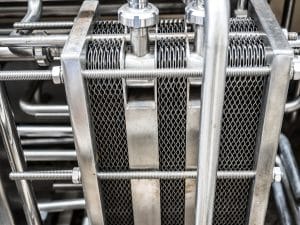 The secret behind how heat exchangers revolutionized electrical thermal management lies in their efficient, eco-friendly methods of transferring waste heat. For instance, instead of actively chilling the air inside of an electrical enclosure, a heat exchanger’s fluid can absorb the heat and transfer it safely away from components that could be damaged by it. Depending on the specific application, heat exchanger technology can be applied in several ways, such as heat spreading, conduction, natural/forced convection, or a combination of these and other techniques. (more…)
The secret behind how heat exchangers revolutionized electrical thermal management lies in their efficient, eco-friendly methods of transferring waste heat. For instance, instead of actively chilling the air inside of an electrical enclosure, a heat exchanger’s fluid can absorb the heat and transfer it safely away from components that could be damaged by it. Depending on the specific application, heat exchanger technology can be applied in several ways, such as heat spreading, conduction, natural/forced convection, or a combination of these and other techniques. (more…)
The Modern Science of Thermal Management Design
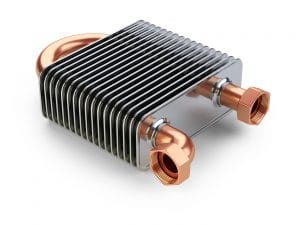 The science of electrical thermal management grows more complex every time new technology is developed or old technology is improved upon. Typically, new technologies are more powerful than their predecessors, and therefore, need higher performing heat transfer methods. However, new applications are also generally smaller than those before them, which means their thermal management solutions also have to fit into tighter spaces. To effectively and efficiently meet the changing demands of innovative technology, heat exchangers are often the ideal thermal management solution. Designing more powerful thermal management solutions is easier and less time-consuming when the designs are based on proven, highly customizable technology, such as heat exchangers. (more…)
The science of electrical thermal management grows more complex every time new technology is developed or old technology is improved upon. Typically, new technologies are more powerful than their predecessors, and therefore, need higher performing heat transfer methods. However, new applications are also generally smaller than those before them, which means their thermal management solutions also have to fit into tighter spaces. To effectively and efficiently meet the changing demands of innovative technology, heat exchangers are often the ideal thermal management solution. Designing more powerful thermal management solutions is easier and less time-consuming when the designs are based on proven, highly customizable technology, such as heat exchangers. (more…)
Why Companies Rely on Heat Exchangers
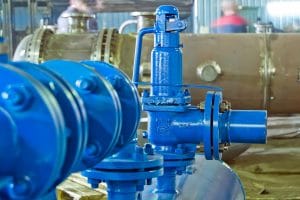 The heat exchanger market has become a worldwide industry as more and more companies rely on them for a variety of thermal management needs. In addition to cooling electrical control cabinets, which made heat exchangers famous, the technology is now used for broad range of applications throughout virtually every industry. The reason companies continue to rely on heat exchangers is because they continue to help reduce overall costs and improve productivity as they advanced along with more powerful technology. That means even as manufacturing equipment and other technologies grow more powerful, heat exchangers continue to be able to effectively and efficiently meet their high-performance thermal management demands. (more…)
The heat exchanger market has become a worldwide industry as more and more companies rely on them for a variety of thermal management needs. In addition to cooling electrical control cabinets, which made heat exchangers famous, the technology is now used for broad range of applications throughout virtually every industry. The reason companies continue to rely on heat exchangers is because they continue to help reduce overall costs and improve productivity as they advanced along with more powerful technology. That means even as manufacturing equipment and other technologies grow more powerful, heat exchangers continue to be able to effectively and efficiently meet their high-performance thermal management demands. (more…)
The Role of Heat Exchangers in Oil & Gas Processing
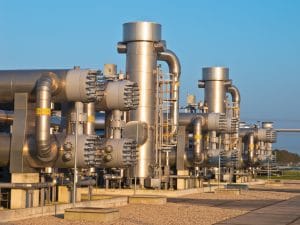 Thermal management has always been important, and in many instances, complex. Yet, in hazardous fields like oil and gas processing, there are more considerations than usual when it comes to implementing electrical and other thermal management solutions. For example, consistent and reliable thermal management is especially important to minimize the need for employees to venture out to fix or maintain equipment. The ability to cool equipment without drawing on enormous amounts of energy is essential for companies to control overhead costs. These and other special considerations make thermal management in oil and gas processing particularly challenging, and heat exchangers are often up for the challenge. (more…)
Thermal management has always been important, and in many instances, complex. Yet, in hazardous fields like oil and gas processing, there are more considerations than usual when it comes to implementing electrical and other thermal management solutions. For example, consistent and reliable thermal management is especially important to minimize the need for employees to venture out to fix or maintain equipment. The ability to cool equipment without drawing on enormous amounts of energy is essential for companies to control overhead costs. These and other special considerations make thermal management in oil and gas processing particularly challenging, and heat exchangers are often up for the challenge. (more…)
The Most Important Benefits of Heat Exchangers
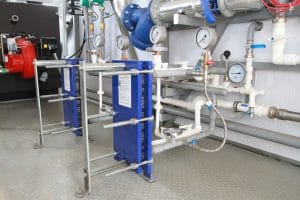 Heat exchangers have been an important part of electrical thermal management for several decades, and they continue to grow even more popular as more industries take advantage of their benefits. Most importantly, those benefits include the ability to effectively and efficiently transfer electrical waste heat without the exorbitant energy and maintenance needs that are typically associated with other forms of thermal management. When implemented in most manufacturing and other industry processes, these benefits can have a widespread impact on a company’s overall operations. (more…)
Heat exchangers have been an important part of electrical thermal management for several decades, and they continue to grow even more popular as more industries take advantage of their benefits. Most importantly, those benefits include the ability to effectively and efficiently transfer electrical waste heat without the exorbitant energy and maintenance needs that are typically associated with other forms of thermal management. When implemented in most manufacturing and other industry processes, these benefits can have a widespread impact on a company’s overall operations. (more…)
Testing the Feasibility of Heat Exchangers for Optimal Solutions
 The ability to keep up with continuously advancing technology is one of modern heat exchangers’ greatest strengths. By taking advantage of a variety of efficient and eco-friendly heat transfer methods, heat exchangers can be customized or custom-designed to fit new applications with increasing power outputs and thermal management demands. To ensure that each thermal management solution is the optimal one, feasibility studies are typically performed to analyze and test new ideas according to the application’s requirements. This is especially useful when innovating new concepts and designs to meet the demands of more powerful and advanced technology. (more…)
The ability to keep up with continuously advancing technology is one of modern heat exchangers’ greatest strengths. By taking advantage of a variety of efficient and eco-friendly heat transfer methods, heat exchangers can be customized or custom-designed to fit new applications with increasing power outputs and thermal management demands. To ensure that each thermal management solution is the optimal one, feasibility studies are typically performed to analyze and test new ideas according to the application’s requirements. This is especially useful when innovating new concepts and designs to meet the demands of more powerful and advanced technology. (more…)
Sustainable Wastewater Treatment with Heat Exchangers
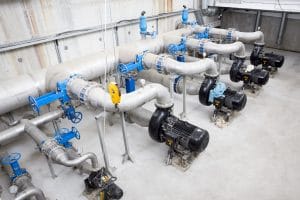 Like thermal management, wastewater treatment is a vital part of many industries. Some facilities do nothing else but treat wastewater, such as municipal treatment plants. However, even unrelated industries rely on the process of removing toxins and harmful chemicals from the water produced as a result of their processes. In most cases, successful wastewater treatment is a continuous process, and making it a sustainable one means implementing more reliable and efficient thermal management solutions, such as advanced heat exchangers. (more…)
Like thermal management, wastewater treatment is a vital part of many industries. Some facilities do nothing else but treat wastewater, such as municipal treatment plants. However, even unrelated industries rely on the process of removing toxins and harmful chemicals from the water produced as a result of their processes. In most cases, successful wastewater treatment is a continuous process, and making it a sustainable one means implementing more reliable and efficient thermal management solutions, such as advanced heat exchangers. (more…)
Does Thermal Management Really Affect Production?
 In any industry, there are several factors that affect efficiency and productivity, especially as more and more companies rely on technology for their production processes. One of the most consistent factors, however, is electrical thermal management. Even the most advanced technology needs an efficient way to transfer the waste heat that it gives off. In industrial applications, the effectiveness of that thermal management can greatly impact a company’s overall production. With heat exchangers, that impact is a positive one; the cleaner, more efficient, and more reliable thermal management they provide helps ensure that electrical equipment and machinery can operate continuously without overheating. (more…)
In any industry, there are several factors that affect efficiency and productivity, especially as more and more companies rely on technology for their production processes. One of the most consistent factors, however, is electrical thermal management. Even the most advanced technology needs an efficient way to transfer the waste heat that it gives off. In industrial applications, the effectiveness of that thermal management can greatly impact a company’s overall production. With heat exchangers, that impact is a positive one; the cleaner, more efficient, and more reliable thermal management they provide helps ensure that electrical equipment and machinery can operate continuously without overheating. (more…)
Cooling High-Performance Tech in Advanced Medical Devices
 Some of the most advanced and powerful technology is that used in modern medical devices, such as high-powered imaging equipment, surgical lasers, and even handheld diagnostic devices. Like most advanced technology, the thermal management solutions used for medical devices have to be able to keep up with the application’s power output. More power means more waste heat, and smaller devices mean less space to effectively manage that heat. Unlike other types of technology, however, cooling medical equipment comes with a few unique challenges, such as properly insulating the heat exchanger and equipment to keep them safe enough for human contact. (more…)
Some of the most advanced and powerful technology is that used in modern medical devices, such as high-powered imaging equipment, surgical lasers, and even handheld diagnostic devices. Like most advanced technology, the thermal management solutions used for medical devices have to be able to keep up with the application’s power output. More power means more waste heat, and smaller devices mean less space to effectively manage that heat. Unlike other types of technology, however, cooling medical equipment comes with a few unique challenges, such as properly insulating the heat exchanger and equipment to keep them safe enough for human contact. (more…)
An Efficient Way to Meet NEMA Enclosure Standards
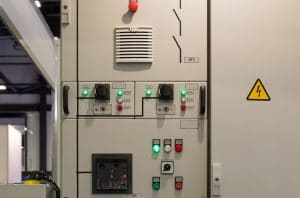 Modern heat exchangers have been a boon to the advancement of electrical thermal management, but their eco-friendly heat transfer methods are only a part of the reason why. In addition to saving energy and reducing maintenance needs, today’s heat exchangers also come in a variety of forms to meet all NEMA standards for electrical enclosures. For equipment and technology that operates under particularly concerning conditions, such as high levels of moisture or powder in the air, NEMA-class enclosures need adequately protected thermal management solutions. Thanks to their revolutionary methods and high-quality seals and gaskets, heat exchangers are often the most efficient and effective option. (more…)
Modern heat exchangers have been a boon to the advancement of electrical thermal management, but their eco-friendly heat transfer methods are only a part of the reason why. In addition to saving energy and reducing maintenance needs, today’s heat exchangers also come in a variety of forms to meet all NEMA standards for electrical enclosures. For equipment and technology that operates under particularly concerning conditions, such as high levels of moisture or powder in the air, NEMA-class enclosures need adequately protected thermal management solutions. Thanks to their revolutionary methods and high-quality seals and gaskets, heat exchangers are often the most efficient and effective option. (more…)







